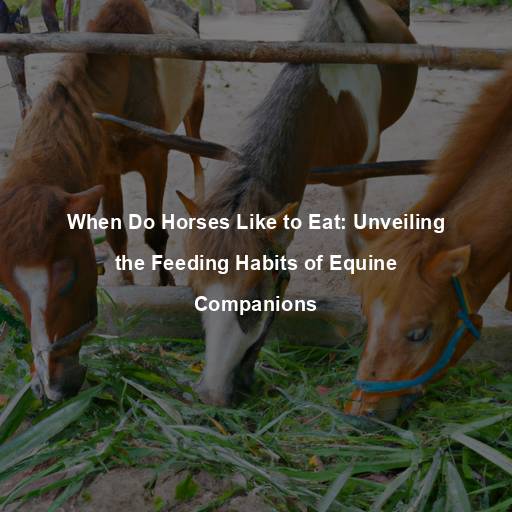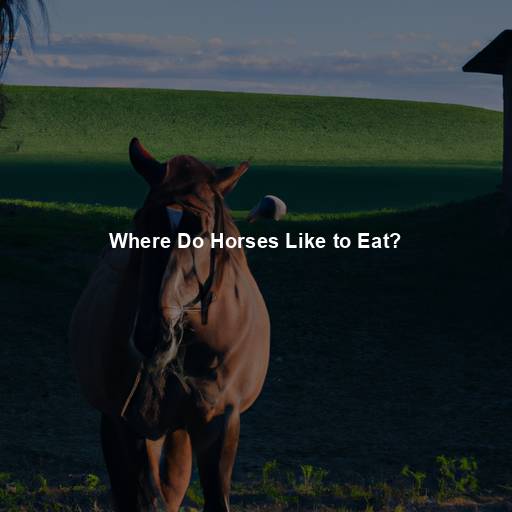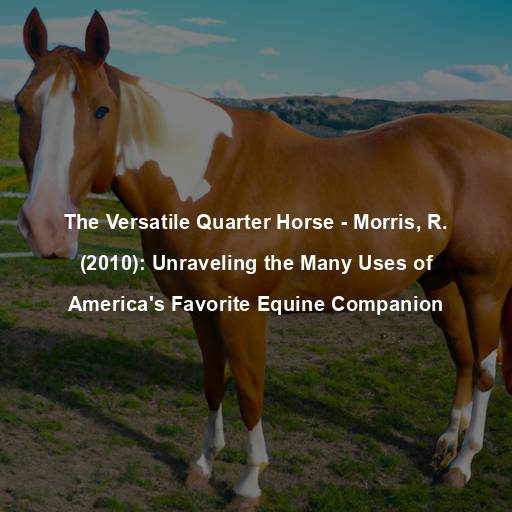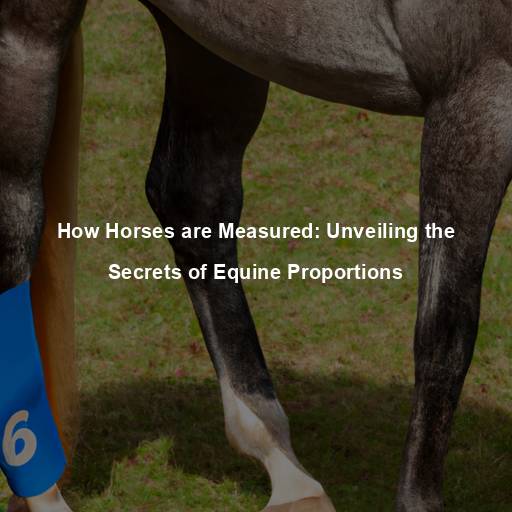When Do Horses Like to Eat: Unveiling the Feeding Habits of Equine Companions
Last Updated on November 3, 2023 by Evan
Contents [hide]
- 1 The Fascinating World of Equine Cuisine
- 1.1 The Natural Grazers: An Evolutionary Perspective
- 1.2 The Significance of Routine: Regular Meal Times
- 1.3 Morning Glory: Breakfast Time for Equine Friends
- 1.4 The Midday Lull: A Time for Rest and Digestion
- 1.5 Twilight Munchies: Dinner Hour for Hungry Horses
- 1.6 The Midnight Snackers: Overnight Feeding Considerations
- 1.7 Listening to Their Bodies: Self-Regulation and Foraging Behavior
- 1.8 Factors Influencing Equine Eating Habits
- 1.9 Social Dynamics: The Power of Herd Influence
- 1.10 Environmental Factors: Nature’s Influence
- 1.11 Feeding Frequency: Breaking It Down
- 1.12 Dietary Composition: The Right Balance
- 1.13 Training and Performance: Fueling Success
- 1.14 Special Considerations: Individual Needs
- 1.15 The Bond Between Humans and Horses: Nurturing Through Nutrition
- 2 FAQs – When do horses like to eat?
- 2.1 When do horses typically eat their meals?
- 2.2 How does the time of day affect a horse’s feeding schedule?
- 2.3 Are there specific times of the day when horses should be fed?
- 2.4 Can horses eat during the night?
- 2.5 Are there any indicators that horses use to signal their hunger?
- 2.6 What should be considered when planning a horse’s feeding schedule?
The Fascinating World of Equine Cuisine
From the enchanting gallop of their hooves to the gentle sway of their mane, horses hold an irresistible charm that has captivated mankind for eons. Yet, amidst this equine enchantment, lies a perplexing enigma – when do these gentle giants prefer to indulge in their delectable meals? Unraveling the mysteries of equine eating patterns is not simply a matter of curiosity, but an essential key to their well-being. In this captivating exploration, we embark on a journey to uncover the intricate intricacies of our equine companions’ gustatory inclinations and unmask the myriad factors that influence their dining choices.
The Natural Grazers: An Evolutionary Perspective
Horses, being herbivores, have evolved as natural grazers. In the wild, they spend most of their waking hours foraging for food, a behavior deeply ingrained in their DNA. This instinctual grazing behavior is a result of their ancestral need to consume small amounts of fibrous vegetation throughout the day. Consequently, horses have adapted to a diet that consists primarily of grasses, hay, and other plant materials.
The Significance of Routine: Regular Meal Times
Just like us, horses rely on routine to flourish. A stable routine, with predictable mealtimes, helps them navigate through their day with a sense of calm and certainty. These majestic creatures find solace in knowing when their next nourishing meal is on the horizon. Embracing a feeding schedule not only nurtures their mental well-being but also promotes a healthy digestive system, keeping them content and vibrant.
Morning Glory: Breakfast Time for Equine Friends
Similar to humans, horses too wake up with a ravenous hunger that demands attention. A customary routine for equestrians entails feeding their majestic companions the first meal of the day come morning. This breakfast, laden with a harmonious amalgamation of nutrient-rich hay, grains, and supplements, serves as a profound source of vigor, igniting their day and empowering their physical and cognitive faculties. With this meticulously balanced feast, horses receive the essential nourishment vital for their holistic wellness and baffle us with their tireless energy and unwavering spirit.
The Midday Lull: A Time for Rest and Digestion
In the world of majestic equines, a curious phenomenon unravels during the midday hours. After indulging in a morning of nibbling and frolicking, horses seem to embrace a perplexing ritual of tranquility. This intriguing interlude grants them respite and a chance to partake in the enigmatic art of passive digestion. And while these noble creatures may occasionally indulge in dainty morsels of hay or a leisurely pasture stroll, their appetite during this enigmatic moment appears to wane, contrasting the fervor of earlier mealtimes.
Twilight Munchies: Dinner Hour for Hungry Horses
As evening shadows creep in, hunger pangs strike our majestic steeds yet again. The anticipation builds as the sun dips lower in the sky, heralding the arrival of dinner time. A vital ritual to replenish their strength after a day of hustle and bustle, this evening feast is meticulously crafted to cater to their dietary needs. A harmonious blend of hay, grains, and specially chosen supplements awaits, seeking to strike a perfect balance between nutrition and indulgence.
The Midnight Snackers: Overnight Feeding Considerations
While not all horse owners implement overnight feeding, it is important to consider the horse’s individual needs and circumstances. Some horses, especially those with specific health conditions or high energy demands, may require a midnight snack. This can be a small portion of hay or a specially formulated feed. However, it is essential to consult with a veterinarian or equine nutritionist to determine if overnight feeding is necessary for your horse.
Listening to Their Bodies: Self-Regulation and Foraging Behavior
Horses have an incredible ability to self-regulate their food intake. In the wild, they roam vast grassy plains, selecting and consuming small amounts of food as they go. This natural foraging behavior allows horses to maintain a healthy weight and prevents overeating. When provided with ample pasture or access to hay throughout the day, horses will graze intermittently, taking breaks to rest and engage in social interactions.
Factors Influencing Equine Eating Habits
Understanding the factors that influence equine eating habits is pivotal in providing appropriate care for our beloved horses. Here are some key considerations:
- Age: Younger horses, such as foals and weanlings, have higher energy requirements and may need more frequent meals compared to adult horses.
When it comes to our equine companions, are we providing them with the nourishment they need for their demanding lifestyles? It is well-known that horses involved in rigorous activities, such as intense competition or regular training, require a little extra in terms of nutrition to keep them going strong. Adequate feed not only fuels their performance but also plays a crucial role in aiding their muscle recovery. Let’s delve deeper into what these majestic creatures truly require to thrive in their bustling world.
-
Seasonal Variations: During colder months, horses may naturally increase their food intake to generate internal heat and maintain body condition.
-
Health Conditions: Certain health conditions, such as dental issues or metabolic disorders, can impact a horse’s ability to eat and digest food. It is crucial to address any underlying health concerns to ensure proper nutrition.
Social Dynamics: The Power of Herd Influence
Horses, those magnificent creatures, are innately social beings, finding solace and strength in the company of their fellow equines. Fascinatingly, their dining habits are profoundly influenced by the intricate web of interactions woven within the herd. When gathered together, these majestic beasts may unleash their competitive spirits, engaging in spirited jousts for the much-coveted food resources. Consequently, conscientious consideration of the intricate hierarchy and ever-shifting social dynamics becomes essential when nourishing multiple horses simultaneously, ultimately paving the path for harmonious and equitable mealtimes.
Environmental Factors: Nature’s Influence
The environment in which horses are kept can impact their eating habits. Factors such as weather conditions, pasture quality, and access to shelter can all affect their appetite and feeding patterns. Horses may adjust their grazing behavior based on environmental cues, seeking shelter during inclement weather or actively foraging when pasture grasses are abundant.
Feeding Frequency: Breaking It Down
When it comes to horses, their eating habits can be as diverse and perplexing as their personalities. While some horses prefer to graze leisurely all day long, others demand a more regimented feeding routine. Striking the right balance between providing them with round-the-clock access to pasture or hay and implementing a structured meal plan is crucial for their wellbeing. It’s all about understanding their unique needs, taking into account their activity level, metabolism, and overall health, to ensure they receive the optimum nutrition they require.
Dietary Composition: The Right Balance
Delving into the intricate world of equine nutrition, it becomes abundantly clear that crafting a diet for our majestic companions is no simple feat. Striking the perfect balance between nourishment and sustenance is paramount; a harmonious concoction of nutrient-rich forage, be it the indulgence of fragrant hay or the lusciousness of a sprawling pasture, supplemented with grains, minerals, and vitamins to satisfy their inner cravings. Engaging the expertise of an equine nutritionist ensures a bespoke dietary blueprint, curated to cater to the singular dietary needs of these magnificent creatures. Let the quest for gastronomic excellence commence!
Forage: A Staple for Equine Health
When it comes to keeping our equine companions happy and healthy, the role of high-quality forage cannot be stressed enough. Whether it’s the goodness of nutrient-rich grass hay or the nourishing properties of luscious alfalfa, forage forms the foundation of a horse’s diet. With its magical ability to assist in digestion and promote a happy gut, fiber-rich forage is truly a gift from nature. Ensuring that our majestic friends have constant access to this vital resource, either through leisurely grazing or regular hay feedings, is a surefire way to keep them content and in optimal condition.
Concentrates: Supplementing the Diet
When it comes to tending to our equine companions, balancing their dietary needs can be as perplexing as solving a Rubik’s Cube blindfolded. While forage undoubtedly takes center stage in their gastronomic repertoire, the addition of concentrates, such as grains or pelleted feeds, becomes a tantalizing option to fulfill their unique nutritional cravings. Yet, navigating this delectable maze with precision demands a keen understanding of a horse’s age, workload, and overall health, as these factors dance together in an intricate tango, dictating the type and quantity of concentrates to be bestowed. However, a word of caution must echo through the stables, urging us to tread carefully on this gustatory path, as an overindulgence in grains may trigger a tempest of digestive distress.
Water: The Elixir of Life
Keeping your horse properly hydrated is of utmost importance for their overall well-being. It is imperative to provide them with access to clean, fresh water at all times to support their fluid needs. However, it’s important to note that their water intake can vary significantly due to a plethora of factors like the weather, their activity levels, and even the composition of their diet. Therefore, closely monitoring their water consumption and ensuring a reliable water source is absolutely crucial to prevent dehydration and ensure that their bodily functions are functioning at their best.
Training and Performance: Fueling Success
Horses engaged in rigorous training or performance activities have increased energy demands. Feeding strategies should be adjusted to support their athletic endeavors. Providing additional calories through increased concentrate portions or specialized performance feeds can help meet these heightened energy requirements. Working closely with a veterinarian or equine nutritionist can ensure that performance horses receive the necessary nutrition to excel in their respective disciplines.
Special Considerations: Individual Needs
Each horse is unique, and individual factors must be taken into account when determining feeding strategies. Some horses may have specific dietary restrictions due to health conditions or allergies, requiring specialized diets. For example, horses with metabolic disorders such as equine metabolic syndrome (EMS) or insulin resistance may require carefully managed diets low in sugars and starches. Others may have dental issues that necessitate softer or more easily chewed feeds.
The Bond Between Humans and Horses: Nurturing Through Nutrition
When it comes to looking after our majestic equine companions, there’s more to it than just offering them shelter and friendship. To truly care for a horse, we must dive into the intricate world of nutrition. By unraveling the mysteries behind their eating habits and customizing their diet accordingly, we can pave the way for a vibrant partnership, filled with vitality and contentment. A solid groundwork of wholesome nutrition not only strengthens the connection between us and these magnificent creatures, but also plays a pivotal role in their holistic welfare.
FAQs – When do horses like to eat?
When do horses typically eat their meals?
Horses are grazing animals by nature, and they have a natural instinct to eat small amounts of food continuously throughout the day. In general, horses prefer to eat small meals every few hours rather than consuming large portions at once. They typically spend most of their day foraging and eating, with periods of rest in between.
How does the time of day affect a horse’s feeding schedule?
When it comes to horses and their eating habits, one thing is for sure – there is no one-size-fits-all schedule. These majestic creatures have their own unique preferences and routines when it comes to mealtime. While they tend to graze more during the day and take it easy at night, the exact timing can be influenced by a variety of factors. From their individual tastes to how they are managed and the environment they live in, each horse adds its own burst of unpredictability to the feeding equation.
Are there specific times of the day when horses should be fed?
Feeding horses can be a bit of a puzzle, with numerous factors playing into the equation. From their daily routines to the availability of pasture or forage, there’s no one-size-fits-all answer. However, a general guideline suggests that horses typically enjoy their main meals in the morning and evening, with a dependable gap of 8-10 hours. It’s important to keep in mind that every horse is unique, and consulting with professionals like veterinarians or equine nutritionists is pivotal in constructing a feeding schedule that caters to the particular needs and lifestyle of each equine companion.
Can horses eat during the night?
When it comes to equine dining habits, there’s some fascinating complexity. Horses, those majestic creatures, possess the peculiar talent of munching away in the moonlit hours, granted there’s food readily available. Nevertheless, experts generally advise against excessive nocturnal snacking, especially for steeds residing in stables or confined spaces. Ah, but fear not! To replicate their wild grazing tendencies and avoid tummy troubles like colic, wise caretakers suggest providing these elegant beings with a generous supply of forage or hay prior to their overnight slumber. This way, their feeding schedule remains harmoniously balanced, and their digestion stays contentedly at ease. Quite a waltz of precaution and nourishment, wouldn’t you agree?
Are there any indicators that horses use to signal their hunger?
When it comes to letting us know they’re feeling peckish, horses have quite the repertoire. They might start pacing back and forth, restlessly throwing hints at us like a game of equine charades. Or perhaps they’ll dig their hooves into the ground, as if they’re sending Morse code messages right beneath our feet. Sometimes, they’ll let out a soft, gentle nicker, a subtle whisper that only we can hear. And let’s not forget their unwavering focus on their feeding area, like they’re planning their meals with scientific precision. But be warned, dear reader, neglect their hunger and you’ll witness their energy wane, their bodies slowly shedding precious pounds, and even their temper turning against their fellow four-legged comrades. So, horse owners and caretakers, keep your senses sharp, and listen closely to the enigmatic language of hunger that our equine friends so mysteriously convey.
What should be considered when planning a horse’s feeding schedule?
When planning a horse’s feeding schedule, several factors should be taken into account. These include the horse’s age, weight, activity level, overall health condition, and any dietary restrictions they may have. Additionally, the availability of grazing pasture, access to clean water, and the type and quality of forage or concentrate feed should also be considered. Consulting with an equine nutritionist or veterinarian is highly recommended to develop an appropriate feeding plan tailored to the specific horse’s needs and circumstances.







